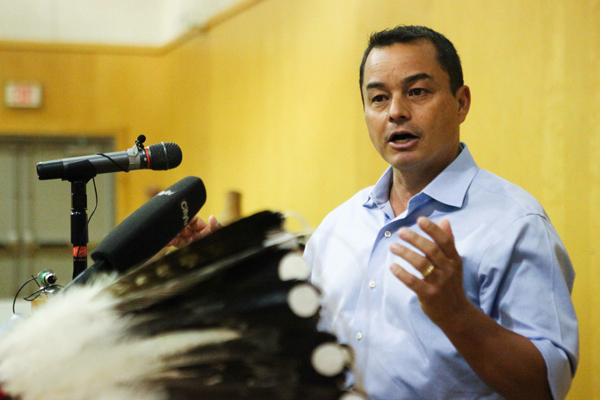The support of Assembly of First Nations National Chief Shawn Atleo for a major bill that would overhaul First Nations education was seen by the federal government as its best bargaining chip in the bill's passage, according to Nathan Matthew, senior advisor and negotiator for the First Nations Education Steering Committee in B.C.
But with Atleo's surprise resignation from the position earlier today, Prime Minister Stephen Harper has far less leverage in convincing First Nations to accept the bill, Matthew said.
In his resignation speech today, Atleo said that while he still supported it, he was no longer willing to be a "lightning rod" for criticism of the bill, which has divided aboriginal groups.
"Now that [Harper] doesn't have the national chief there, he's going to face the full attention of the [Assembly] executive, who will replace in the interim the national chief," said Matthew. A lot of those regional chiefs in the executive have voiced their opposition to this bill."
When Harper announced the release of the first draft of Bill C-33: First Nations Education Improvement Act in February at an Alberta high school, Chief Atleo was in attendance.
"What we are hearing the government commit to is a new way forward," Atleo said at the time. The bill promised $1.25 billion in funding for on-reserve education over three years beginning in 2016 -- a year after the next federal election -- and an annual funding increase of 4.5 per cent thereafter.
But the bill faced harsh criticism from other First Nations leaders and educators, including Atleo's formal rival for the national chief role, Ryerson University professor Pamela Palmater, who maintains Atleo had no power to approve the bill on behalf of all First Nations.
"Shawn Atleo made a 'historic' deal with Prime Minister Stephen Harper on First Nation education. What makes this deal so historic? Well, it's the deal that no First Nation asked for and it's one that Atleo had no power to make," Palmater wrote in a recent op-ed for Rabble.ca.
"It's historic because not only will Atleo go down in history as the worst National Chief, but he has taken the [Assembly of First Nations] down with him."
Feds rejected bill's 'co-development': Matthew
The First Nations Education Steering Committee has also spoken out against the bill.
The organization acts as a de facto school board for the majority of First Nations' on-reserve schools in British Columbia. In January 2012, it signed a tripartite agreement with the provincial and federal governments to deliver education on reserves, boosting annual funding for schools to bring them on par with public schools in the province.
But the agreement expires in 2017, and the province's on-reserve schools would then be subjected to the proposed legislation, which Matthew described as too prescriptive in terms of how a First Nations school should be run.
"[The tripartite agreement] is not perfect, but it's something that all of the First Nation schools negotiated," he said. "If the legislation recognized the continuation of that tripartite agreement and been flexible and respected regional diversity, then we probably would have been a lot more easy on the legislation."
Matthew said the bill does not respect the five conditions the Assembly of First Nations and national chiefs outlined last year, which are to respect for First Nations treaties, title, and control over education; statutory guarantee of funding; funding to support education systems grounded in indigenous languages and cultures; mechanisms to ensure both government and First Nations remain accountable, and that there is no unilateral oversight or authority; and ongoing meaningful dialogue and co-development of options.
Instead, Matthew said the federal government "did not allow co-development" of the system with First Nations in drafting its bill. Other concerns include the positioning of the minister of Aboriginal Affairs and Northern Development as the ultimate authority in First Nations education; mandatory instruction in English or French; and no commitment to funding on par with provincial funding in B.C.
Despite their opposing views on the education bill, the relationship between Atleo and the committee was "very respectful," said Matthew. "He was very supportive of First Nations education; he's made it a priority. He certainly supported what we're doing here in B.C."
Originally from Ahousaht, a First Nations community just north of Tofino, B.C., Atleo was first elected to the position of national chief in 2009, running on a platform of education reform. He won again in 2012, but faced criticism during the election for being too close to the federal government.
The next national chief elections will take place during the Assembly's 2015 Annual General Meeting in Winnipeg. The Assembly of First Nations executive will take over the position of chief in the interim. ![]()
Read more: Indigenous, Education, Federal Politics
















Tyee Commenting Guidelines
Comments that violate guidelines risk being deleted, and violations may result in a temporary or permanent user ban. Maintain the spirit of good conversation to stay in the discussion.
*Please note The Tyee is not a forum for spreading misinformation about COVID-19, denying its existence or minimizing its risk to public health.
Do:
Do not: